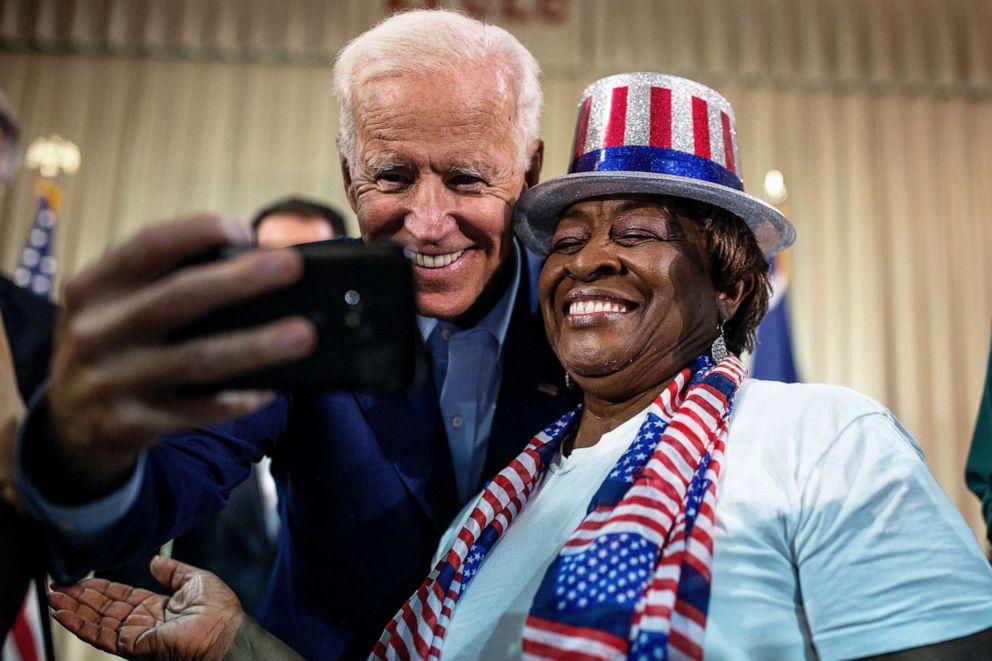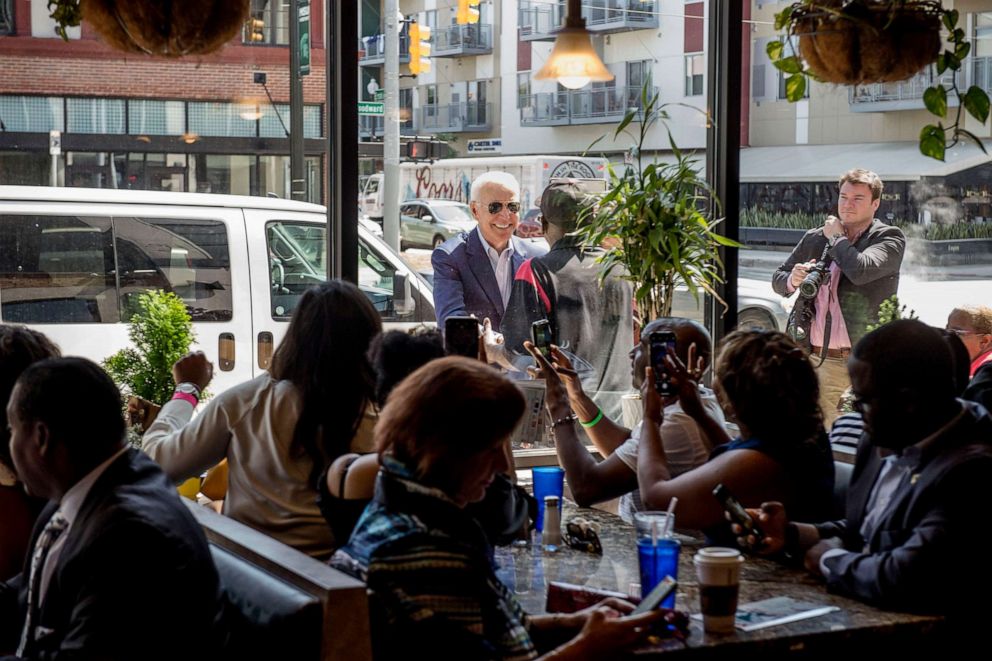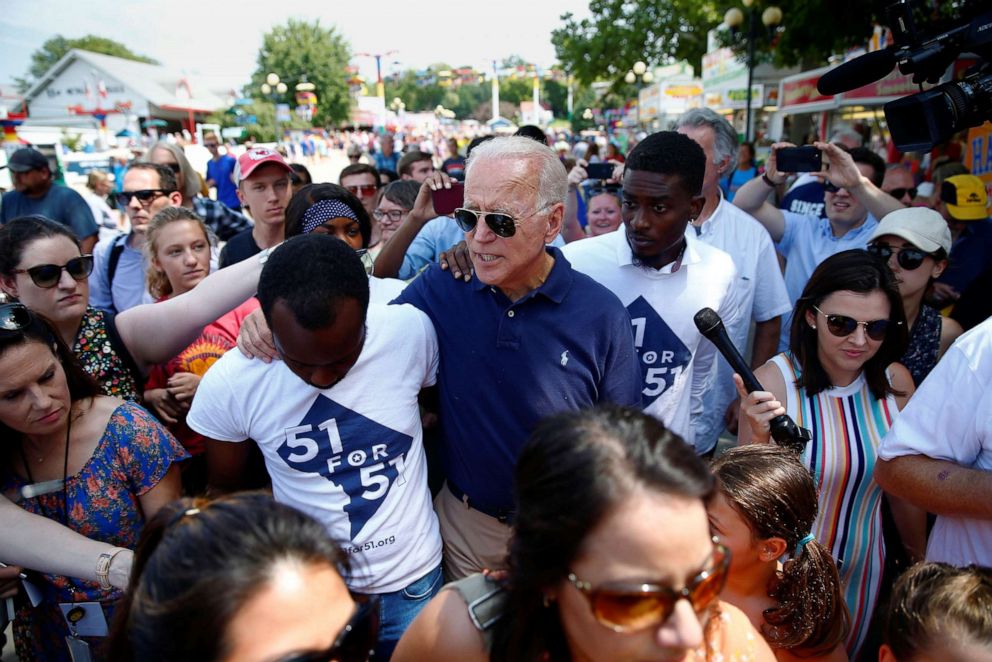Joe Biden talks electability, debates and race with black journalists
The former vice president discussed hot topics in the 2020 Democratic race.
Former Vice President Joe Biden knows he has a target on his back but is dismissing any notion that his lead as the early front-runner candidate is softening.
Instead, in a meeting with a small group of black journalists on Tuesday afternoon, less than a mile away from White House and the office he hopes to claim for himself, Biden insisted black voters -- a key base of the Democratic Party -- have showed him "loyalty."
In the more than 90-minute session that the campaign arranged with 10 national news reporters including journalists from ABC News, Biden offered his perspective on his electability and need for African American support to win the Democratic primary.
Biden brushes off recent poll, touts black voters' support
Biden, who edged out his rivals in the majority of polls, dismissed the new Monmouth University poll that put him in a nearly three-way tie with Sens. Bernie Sanders and Elizabeth Warren for the first time.
"The only poll I've seen that shows me in a tie or even close to tie was that one poll," said Biden. "So, I don't know, but I don't think the polls are going to show much."
The poll placed Biden at 19%, while Sanders and Warren tied for the top spot at 20% as Monmouth asked nearly 300 Democratic and Democratic-leaning voters to identify their pick for the nomination. Monmouth University pollster Patrick Murray has since called the poll an outlier.
In every other poll so far this year, Biden held a steady lead over the rest of the field, including in a poll out Wednesday morning from Quinnipiac University, which shows Biden with 32% support and Warren in second with 19%.
Responding to a question asked by ABC News at the meeting, Biden said he measures his standing in the still very crowded Democratic field by the enthusiasm and size of the crowds on the campaign trail, rather than poll results.
"Walk down the street, people run up to me; I walk into crowds, we're getting big crowds in New Hampshire and the early states," said Biden. "And I'm finding that I've never been to a college campus [where] I haven't been received well."

Biden said he believes that while other candidates may struggle, he can win North Carolina and Florida and has a chance to win in Texas and Georgia. He also told reporters his candidacy will help down-ballot in state races across the country.
The former vice president said he believes the broad support he has among different demographics, be it the Rust Belt working-class or college-educated blacks, makes him the candidate poised to take on President Donald Trump.
Biden continues to edge out his rivals among support with black voters, outweighing Sens. Kamala Harris and Cory Booker, and while he said he didn't know why black support for him tops his black rivals, he said he has never felt uncomfortable in the black community.
"I think after all this time, they think they have a sense of what my character is and who I am -- warts and all," he said.
Biden on his debate mistakes, direct attacks
Ahead of ABC's September primary debate in Houston, Biden sent a warning to his 2020 rivals using direct attacks on one another to create a breakout moment.
"We shouldn't be forming a circular firing squad and shooting, because all it does is help Trump," Biden said, acknowledging that other candidates will likely take aim at him.

"I understand why, why there is a target on my back. I get it. It makes sense. I'm ahead -- most polls way ahead," he said. "So what do you do when you get a chance to, you know, raise your profile? Take down Biden."
"Those who made the most direct attacks on another haven't really benefited much by it," said the former vice president, apparently referencing Harris' falling poll numbers since her first primary debate appearance, when she attacked Biden's record on busing to desegregate schools.
Attacks on the Obama-Biden administration during the July debates drew harsh criticism from prominent Democrats who cautioned there was little to be gained personally and for the party.
In previous debates, a typically loquacious Biden opted out of his lengthy remarks, often cutting himself off before the moderators chime in -- a move he appeared to regret.
"I made a mistake not talking. I'd say my time is up. Turns out that's a big mistake to make -- a big mistake. What I used to always be criticized for being the guy told me too long. And so I was trying to solve that," he added.
Biden hints at vice presidential pick
While Biden hasn't yet clinched the nomination, he discussed a potential pick for vice president. He said his pick would "preferably" be a person of color and/or a woman, but wouldn't make any promises because he said the nominee must be on the same page as him when setting an agenda.
"When President Obama gave me authority, he gave me presidential authority -- for real," Biden said.
He added, "I was able to hire a fire. I was able to pick anybody from any part of the government to work on whatever I got assigned to do. And he never second guessed because he knew that he and I were intellectually simpatico in terms of our ideology."
Biden speaks out on institutional racism and white supremacy
Biden labeled institutional racism as "overwhelmingly a white man's problem visited on people of color."
The former vice president continued to attack the president's rhetoric as he has done, but during the meeting, he once again side-stepped a question on whether he believes Trump is white supremacist or white nationalist. He argued that due to the president's high approval ratings, others in the Republican party are "afraid to take him on."

Biden mentioned that he'd spoken with former Attorney General Eric Holder about addressing voting rights.
"I've been talking with length with Eric about this as a friend, incredibly aggressive going after states that, in fact, are trying to curtail the right to vote and try to find actions where there's any evidence of literally criminal conduct," he said.
He additionally discussed how he would handle white supremacist movements, if elected.
"The only way from the founding this country to today, you deal with it, is you attack it, you expose it, you embarrass it, you put people in jail, who engage in things that are illegal, when they're doing it, you call them out," said Biden. "And most of all, we call it out to our children. You call it out to our children. And because look, it's that old thing, silence is complicity."






